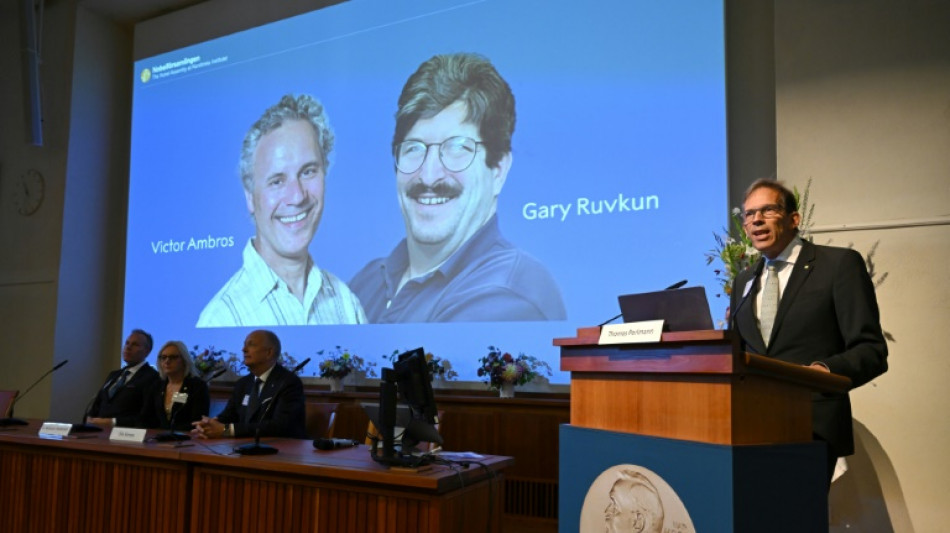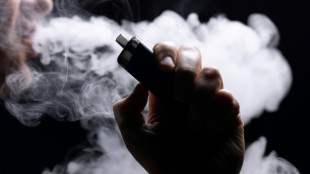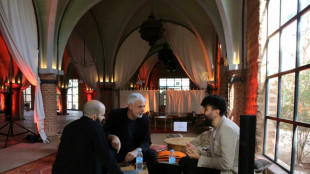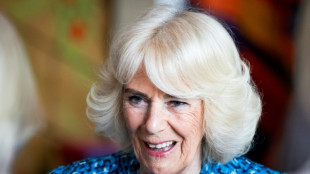
-
 Warhammer maker Games Workshop enters London's top stocks index
Warhammer maker Games Workshop enters London's top stocks index
-
Iran Nobel winner released for three weeks, 'unconditional' freedom urged

-
 Red Cross marks record numbers of humanitarians killed in 2024
Red Cross marks record numbers of humanitarians killed in 2024
-
Johnson's Grand Slam 'no threat', says World Athletics boss Coe

-
 Qatar's emir and UK's Starmer talk trade as state visit ends
Qatar's emir and UK's Starmer talk trade as state visit ends
-
Cuba suffers third nationwide blackout in two months

-
 Russia, Ukraine to send top diplomats to OSCE summit in Malta
Russia, Ukraine to send top diplomats to OSCE summit in Malta
-
Spanish royals to attend memorial service for flood victims

-
 LPGA, USGA new policy requires female at birth or pre-puberty change
LPGA, USGA new policy requires female at birth or pre-puberty change
-
Stick to current climate change laws, US tells top UN court

-
 British Museum chief says Marbles deal with Greece 'some distance' away
British Museum chief says Marbles deal with Greece 'some distance' away
-
Pope Francis receives electric popemobile from Mercedes

-
 Gaza civil defence: thousands flee Israeli strikes, evacuation calls
Gaza civil defence: thousands flee Israeli strikes, evacuation calls
-
Trump names billionaire private astronaut as next NASA chief

-
 Pidcock to leave INEOS Grenadiers at end of season
Pidcock to leave INEOS Grenadiers at end of season
-
Seoul stocks weaken, Paris advances despite political turmoil

-
 South America summit hopes to seal 'historic' trade deal with EU
South America summit hopes to seal 'historic' trade deal with EU
-
DAZN awarded global TV rights for Club World Cup

-
 Top executive shot dead outside New York hotel
Top executive shot dead outside New York hotel
-
Vaping while still smoking unlikely to help quitters: study

-
 British Museum chief says Parthenon Marbles deal with Greece 'some distance' away
British Museum chief says Parthenon Marbles deal with Greece 'some distance' away
-
'Creating connections': Arab, African filmmakers gather at Morocco workshops

-
 Iran frees Nobel winner for three weeks, sparking calls for 'permanent' release
Iran frees Nobel winner for three weeks, sparking calls for 'permanent' release
-
Brazil's Minas cheese gets added to UNESCO list

-
 Top US executive shot dead in New York City: media
Top US executive shot dead in New York City: media
-
Trump's nominee to run Pentagon hangs by a thread

-
 GM announces more than $5 bn hit to earnings in China venture
GM announces more than $5 bn hit to earnings in China venture
-
World chess champ Ding, teen challenger tied past halfway mark

-
 Georgia police raid opposition offices as PM vows to curb protests
Georgia police raid opposition offices as PM vows to curb protests
-
S. Korea opposition begins push to impeach president

-
 Syrian army fights rebel offensive with counterattack
Syrian army fights rebel offensive with counterattack
-
France court upholds Polanski acquittal in defamation case

-
 UK bans daytime TV ads for cereals, muffins and burgers
UK bans daytime TV ads for cereals, muffins and burgers
-
Palace's Guehi to face no formal action over 'Jesus' message on rainbow armband

-
 UK faces trade balancing act with Trump, EU
UK faces trade balancing act with Trump, EU
-
Iran releases Nobel Peace laureate Mohammadi on medical leave: lawyer

-
 UNESCO grants heritage status to Aleppo soap as Syria war flares
UNESCO grants heritage status to Aleppo soap as Syria war flares
-
Ghana's illegal mining boom seeps into presidential election

-
 Inconsistent Spurs 'progressing in all aspects': Postecoglou
Inconsistent Spurs 'progressing in all aspects': Postecoglou
-
France's Orano says Niger junta controls uranium firm

-
 Seoul stocks weaken, Paris edges up tracking political turmoil
Seoul stocks weaken, Paris edges up tracking political turmoil
-
China reports warmest autumn since records began

-
 French marine park to close over law banning killer whale shows
French marine park to close over law banning killer whale shows
-
Thousands march demanding S. Korea president resign over martial law debacle

-
 Taiwan romance novelist Chiung Yao dies at 86
Taiwan romance novelist Chiung Yao dies at 86
-
In Angola, Biden promises to invest differently to China

-
 Syrian army launches counteroffensive against rebels
Syrian army launches counteroffensive against rebels
-
Evenepoel says 'long journey' ahead after postal van collision

-
 South Korea's day of rage as Yoon's martial law founders
South Korea's day of rage as Yoon's martial law founders
-
UK police question killer nurse Letby over further baby deaths

| RBGPF | -1.64% | 61 | $ | |
| CMSC | 0.15% | 24.596 | $ | |
| RELX | 0.94% | 47.93 | $ | |
| RYCEF | 1.46% | 7.55 | $ | |
| NGG | -1.32% | 62.15 | $ | |
| SCS | -0.52% | 13.45 | $ | |
| BTI | 0.35% | 37.16 | $ | |
| RIO | -0.28% | 63.33 | $ | |
| GSK | -1.23% | 34.475 | $ | |
| CMSD | 0.23% | 24.365 | $ | |
| BCC | -0.49% | 145.72 | $ | |
| VOD | -0.4% | 8.795 | $ | |
| BP | -1.05% | 29.145 | $ | |
| JRI | -0.59% | 13.46 | $ | |
| BCE | -1.71% | 26.85 | $ | |
| AZN | -2.35% | 66.49 | $ |

What is microRNA? Nobel-winning discovery explained
The Nobel Prize in Medicine was awarded on Monday to two US scientists for discovering microRNA, a previously unknown type of genetic switch which is hoped can pave the way for new medical breakthroughs.
But while several treatments and tests are under development using microRNAs against cancer, heart disease, viruses and other illnesses, none have actually yet reached patients.
And the world paid little attention when the new Nobel laureates Victor Ambros and Gary Ruvkun revealed their discovery decades ago, thinking it was just "something weird about worms", Cambridge University geneticist Eric Miska told AFP.
Here is an explainer about how exactly these tiny genetic switches work inside our bodies.
- What is microRNA? -
Each cell in the human body has the same set of instructions, called DNA. Some turn into brain cells, while others become muscles.
So how do the cells know what to become? The relevant part of the DNA's instructions is pointed to via a process called gene regulation.
Ribonucleic acid (RNA) normally serves as a messenger. It delivers the instructions from the DNA to proteins, which are the building blocks of life that turn cells into brains -- or muscles.
Miska gave the example of the messenger RNA vaccines rolled out against Covid-19 during the pandemic, which insert a message with new instructions to build proteins that block viruses.
But the two new Nobel winners Ambros and Ruvkun discovered a whole new type of gene regulator that had previously been overlooked by science.
Rather than being the messenger which relays information, microRNA instead acts as a switch to turn other genes off and on.
"This was a whole new level of control that we had totally missed," said Miska, who has worked on microRNA for two decades, including with the new Nobel laureates.
"The discovery of microRNAs brought an additional level of complexity by revealing that regions that were thought to be non-coding play a role in gene regulation," French researcher Benoit Ballester told AFP.
- What did the Nobel winners do? -
Back in the 1980s, Ambros and Ruvkun had been working separately on how genes interact in one-millimetre-long roundworms called C.elegans.
When they compared their work, it led to the discovery of microRNA. Ambros revealed the finding in a 1993 paper.
"Nobody really paid much attention," Miska said, explaining that most scientists at the time thought it only applied to worms.
Then in 2000, Ruvkun published research showing that microRNA is present right across the animal kingdom, including in humans and even some viruses.
"This was not just something weird that worms do, but in fact all animals and plants are totally dependent for development and normal function on them," Miska said.
More than a thousand genes that respond to microRNAs are now believed to be in the human body.
- How could this help us? -
There are numerous new treatments and tests using microRNA that are undergoing trials but none have been made widely available.
"Though there are no very clear applications available yet in microRNAs, understanding them, knowing that they exist, understanding their counter-regulatory networks, is always the first step," the Karolinska Institute's Gunilla Karlsson Hedestam told journalists in Stockholm.
MicroRNAs are particularly promising for fighting cancer because some of these switches "act as a tumour suppressor, so they put a brake on cells dividing inappropriately," Miska said.
Others, meanwhile, induce "cells to divide, which can lead to cancer", he added.
Because many viruses use microRNAs, several antiviral drugs are at varying stages of development, including for hepatitis C.
One complicating factor has been that microRNAs can be unstable.
But scientists also hope they can be used as a test called a "biomarker", which could reveal what type of cancer a patient could be suffering from, for example.
- What next? -
It also appears probable that microRNAs could be involved in the evolution of our species, Miska said.
While human brains are difficult to study, Miska hoped future research will discover more.
O.Lorenz--BTB


